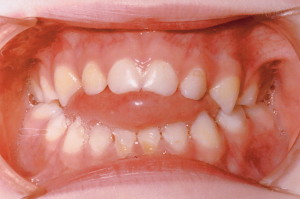The Habit Your Child Needs to Kick
As a pediatric dentist I see it all. Today, I want to talk about how thumb-sucking affects your child’s oral health and jaw structure.
Why do infants and children suck their thumbs?
Babies are naturally inclined to suck, it’s an instinctive habit – it can start in the womb. For some children, this habit will go away after about 6 months. Others continue to do it into preschool age.
It is a soothing ritual that helps them calm themselves in stressful situations or before bed so they can fall asleep.
What problems does it cause?
The problems from thumb-sucking can also be caused by any non-nutritive habits, like general finger-sucking or pacifier use.
Anterior Open Bite
The Beginning Stages
The action of sucking keeps the cheek muscles tight. This prevents the jaw from growing wider.
Also, when you’re sleeping, your tongue naturally rests on the roof of your mouth. If your child is sucking their thumb as they fall asleep, their tongue won’t rest there. (Note: This will also happen to children who breathe with their mouth while they sleep.)
The growth of your tongue actually plays a role in the growth of your jaw. As your tongue grows, your palate does, too. If your tongue isn’t on the roof of your mouth, over time, your tongue will become larger than your jaw and outgrow the space there.
And, your teeth have a natural force of eruption. They will keep going until they run into something – even if that happens to be your tongue.
When this happens, your tongue will tend to protrude forward against the front teeth. Sometimes, the thumb or pacifier itself will push your teeth forward. Often, though, the tongue is the biggest culprit.
This results in an Anterior Open Bite.
What is an Anterior Open Bite?
 Anterior Open Bite is when your upper teeth and lower teeth don’t overlap. The front top teeth rest above your bottom teeth.
Anterior Open Bite is when your upper teeth and lower teeth don’t overlap. The front top teeth rest above your bottom teeth.
It is the most difficult correctional orthodontic treatment and yet a necessary one. You need that open bite to close so that you can bite down. Imagine eating a sandwich and only being able to eat the bread because you can’t get to the meat! That’s what happens with an Anterior Open Bite.
If your child continues to suck their thumb into their toddler years, it can become a permanent problem. If they have a permanent open bite, it will require a surgical procedure to correct it because there will be bone and skeletal structure distortion.
Speech Problems
A change in jaw shape can lead to speech difficulties as well. It can be hard to pronounce Ds and Ts and it can cause a lisp.
How can you prevent these problems?
It’s important to start training your children to have new habits at a young age. They need to kick the thumb-sucking habit before the age of 6 when permanent teeth start showing up. That said, I would prefer they stop sucking as early as 2 so they don’t cause any permanent damage.
Tongue Crib
A quick fix to make sure their jaw doesn’t become misshapen is to have them use a tongue crib. These devices help block the tongue from pushing forward into the teeth. It also can help prevent your child from sucking their thumb.
Gentle Guidance and Incentives
Since thumb-sucking is a soothing habit for children, you shouldn’t approach this in a stress-inducing way. Help them develop other coping techniques while still allowing them to wean themselves gradually.
I would prefer they use a pacifier over their thumb any day. You can take away their pacifier as needed but you really can’t take away their thumbs!
There are bitter flavored sprays you can put on their thumbs to discourage sucking, but some dentists and parents find this method harsh and too negative. It depends on your child and how severe the issue is.
With any of these solutions, you’ll have to find one that works for you and your child. No matter what, it is important to help them break this habit early so they won’t suffer from even more difficult issues in the future.
~Dr. Rhea Haugseth





